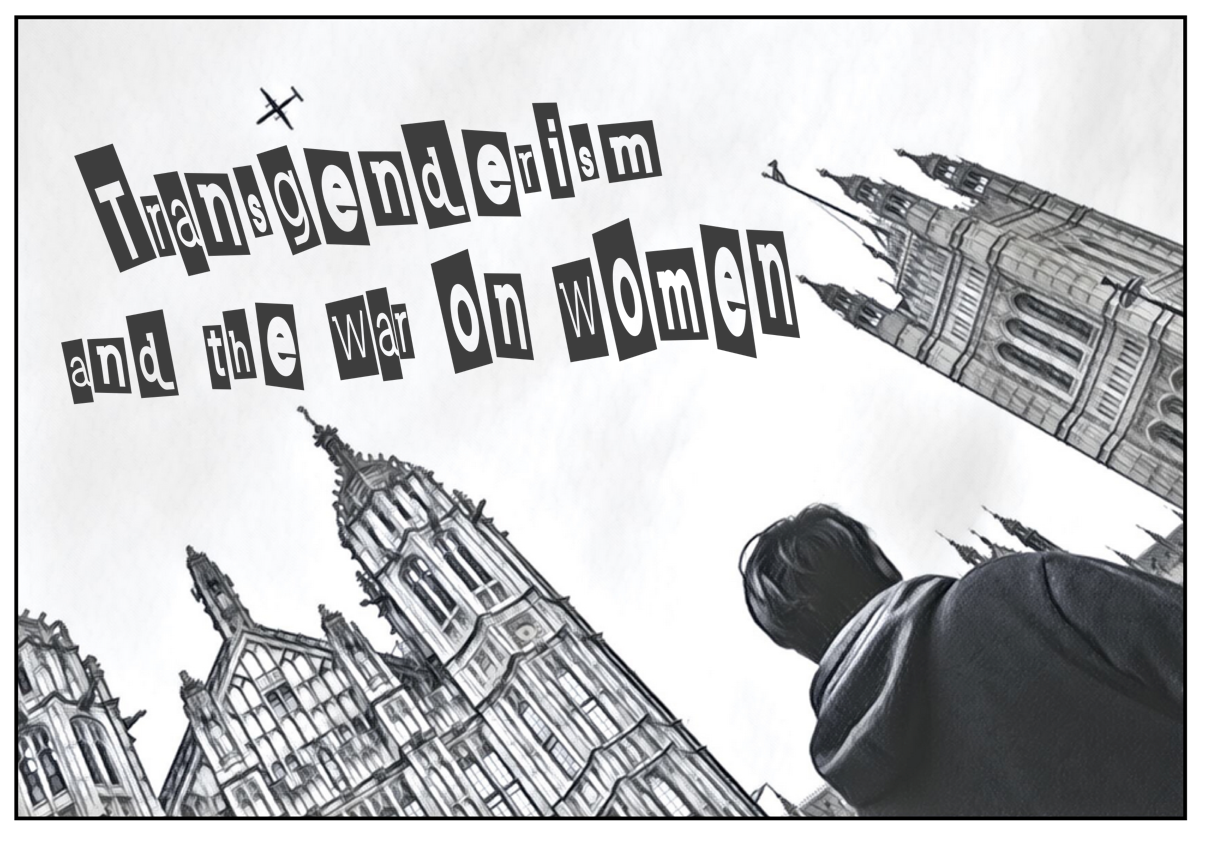
Jessie Maynard outside the Houses of Parliament 14/3/18
 When Venice Allan decided she wanted to book ‘The Den’ at Millwall football club for the ‘Transgenderism and the War on Women’ event, Julia Long had reservations. Long didn’t know much about football but she knew the club’s reputation in the 70s and 80s; the preferred chant of their fans, ‘no-one likes us; we don’t care’ and she didn’t think it was a good idea to be associated with that history of violence and hooliganism.
When Venice Allan decided she wanted to book ‘The Den’ at Millwall football club for the ‘Transgenderism and the War on Women’ event, Julia Long had reservations. Long didn’t know much about football but she knew the club’s reputation in the 70s and 80s; the preferred chant of their fans, ‘no-one likes us; we don’t care’ and she didn’t think it was a good idea to be associated with that history of violence and hooliganism.

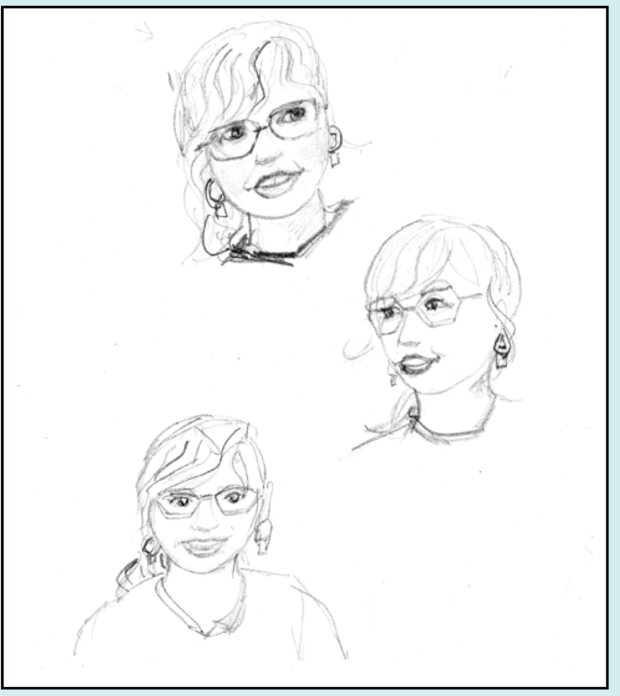
Venice Allan at the House of Commons. Sketch by Michele-not-on-Twitter.
Allan eventually persuaded Long that it was a good idea, and the booking went ahead. The event was announced on social media and several hundred tickets sold.
All seemed to be going to plan until they received an email from a staff member at Millwall describing the ‘relentless assault’ of complaints the club had received from transactivists.
The staff member told them that Millwall had never seen anything like it, and were backing out of hosting the event because not only were they concerned about the welfare and safety of their staff but – oh, the irony! – because they had concerns for their reputation.
The transactivists were delighted!
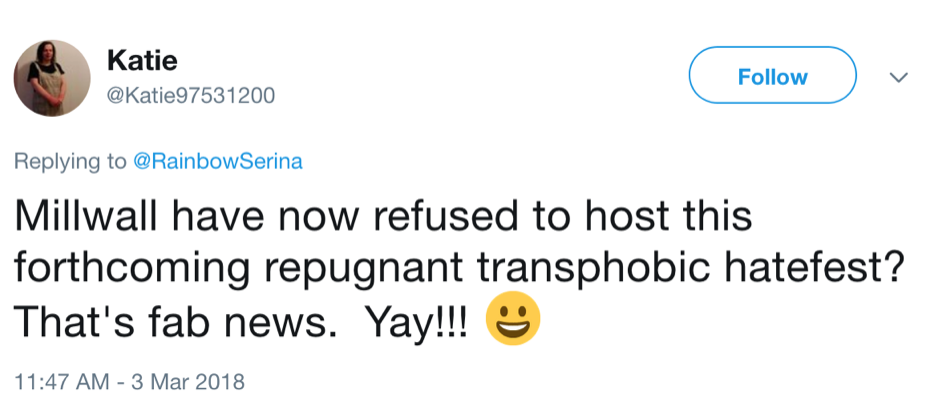
Undaunted, Venice contacted MP David Davies and asked if the meeting could be held at the House of Commons. To the surprise of most of us – if not Allan herself – Davies agreed to sponsor it. So many tickets had been sold by this point that the venue was unable to accommodate us all; it was asked that some people give up their tickets in exchange for a pass to the next event, and decided that on this occasion the meeting should be for women only.
The transactivists were horrified!
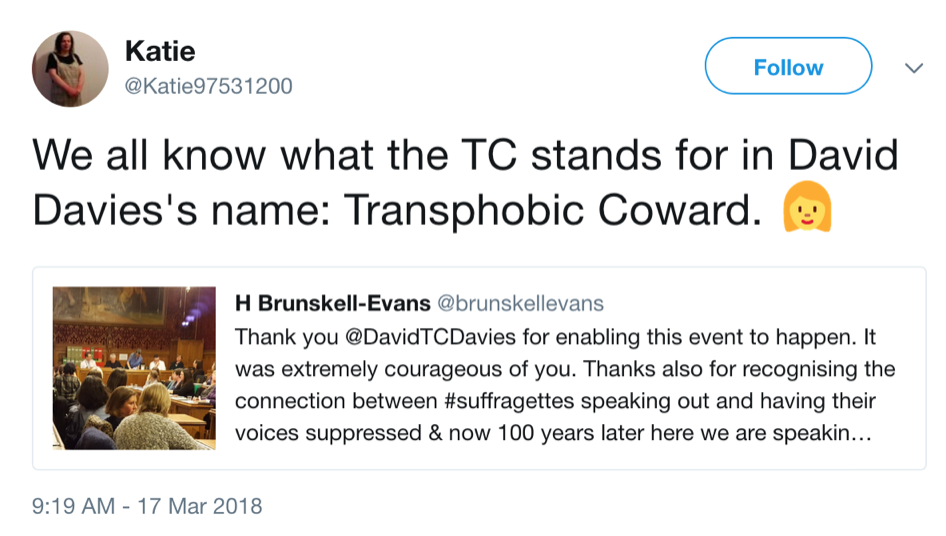
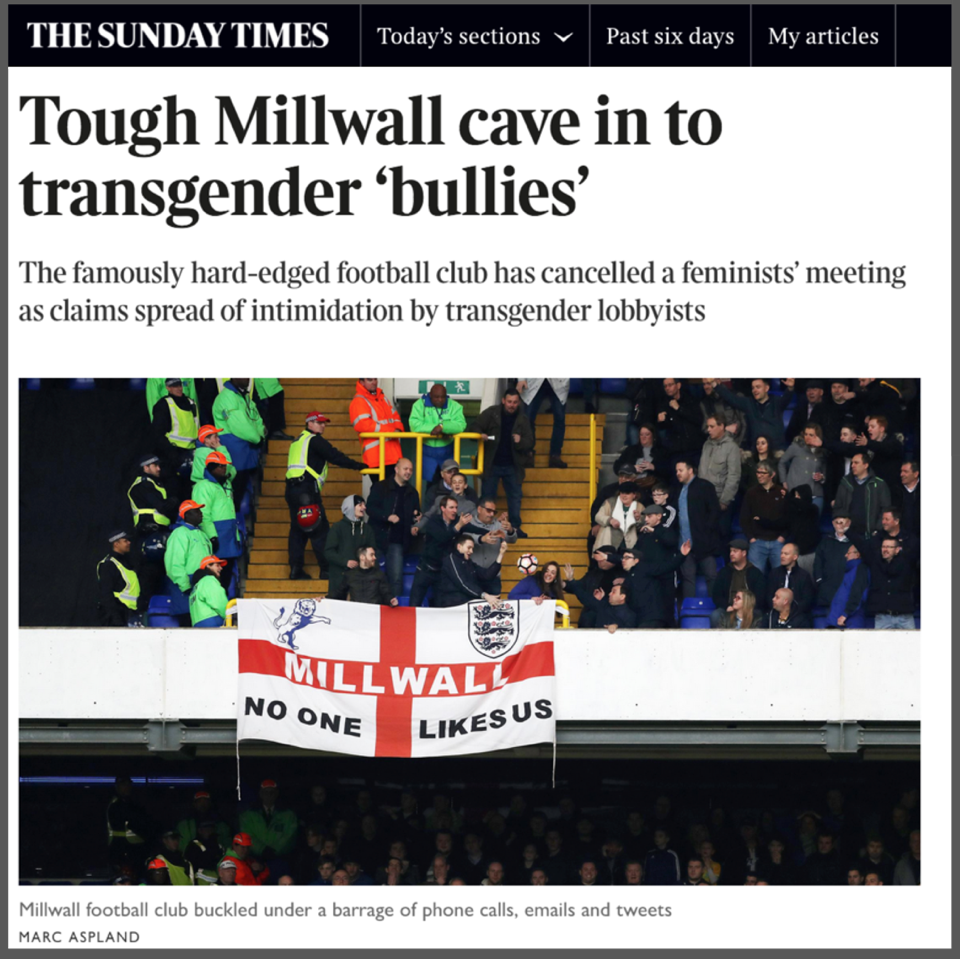 “It’s hilarious but at the same time: three lesbian feminists having a bit of a talk about, well, something that’s really a bit boring titled ‘The Gender Recognition Act’? And Millwall say they’ve never seen anything like it?” chuckled Julia Long, in the introduction to her talk. “We heard the same report from David’s office as well … the House of Commons have hosted meetings with Hamas; the IRA and yet they’ve never known anything like it. So we’ll have to copyright it: “Never seen anything like it!”
“It’s hilarious but at the same time: three lesbian feminists having a bit of a talk about, well, something that’s really a bit boring titled ‘The Gender Recognition Act’? And Millwall say they’ve never seen anything like it?” chuckled Julia Long, in the introduction to her talk. “We heard the same report from David’s office as well … the House of Commons have hosted meetings with Hamas; the IRA and yet they’ve never known anything like it. So we’ll have to copyright it: “Never seen anything like it!”

So that’s how my daughter Jessie and I found ourselves at the House of Commons on the evening of Wednesday, March 14th, 2018. For those of you who have never visited the Houses of Parliament, the imposing grandeur of the outside is only dwarfed by the spectacular interior. Stunning artworks are painted directly onto the walls. (You can see one of my favourites here) Stained glass windows loom over stone staircases and the hallways are lined with white marble statues of scowling, corpulent men garbed in frills and wigs, strangely reminiscent of some of my evenings on Twitter. Photography is only allowed in St Stephens’ and Westminster Halls, where, overlooked by Queen Eleanor of Castile (left), we waited for seven o’clock to arrive.
For me, it was a bit like a Who’s Who of 21st century Twitter feminism. It was great to see familiar faces. Emma was there of course, networking as ever. But over there I saw… and oh gosh, wasn’t that…
There was plenty to look at and chat about as we waited. The coffee shop was closed – why does that always happen to me? I was introduced to new people and put faces to the names of many women I’ve interacted with online. I found myself thinking of the Black Mirror episode ‘Nosedive’ and wishing everyone could have their Twitter handles floating above their heads.
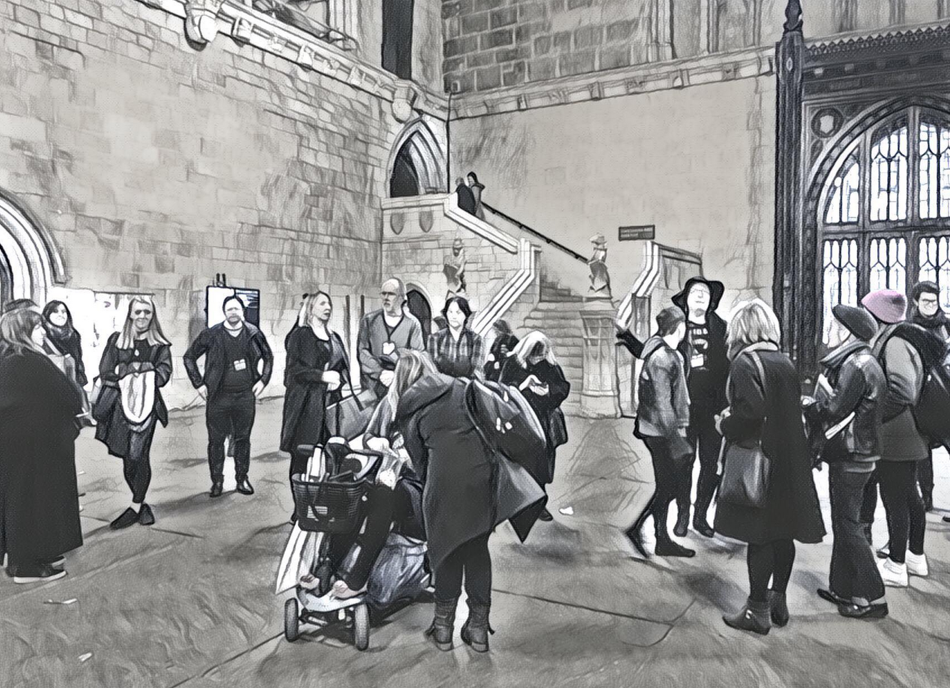 When ten to seven came around male allies and those who had given up their spaces at the talk but still come along to show solidarity, were escorted to the pub by Miranda Yardley where evidently a good time was had by all.
When ten to seven came around male allies and those who had given up their spaces at the talk but still come along to show solidarity, were escorted to the pub by Miranda Yardley where evidently a good time was had by all.
(I was later told that about 5 male allies were able to squeeze into the back of the room- it was so packed that I couldn’t see them from my vantage point!)
Shortly before seven, the rest of us filed into the imposing Committee Room 10, where long wood and leather tables awaited us, water and a notepad by every seat. Jessie and I slipped into seats near the front: the meeting started, and I began to scribble frantically…
PROFESSOR SHEILA JEFFREYS
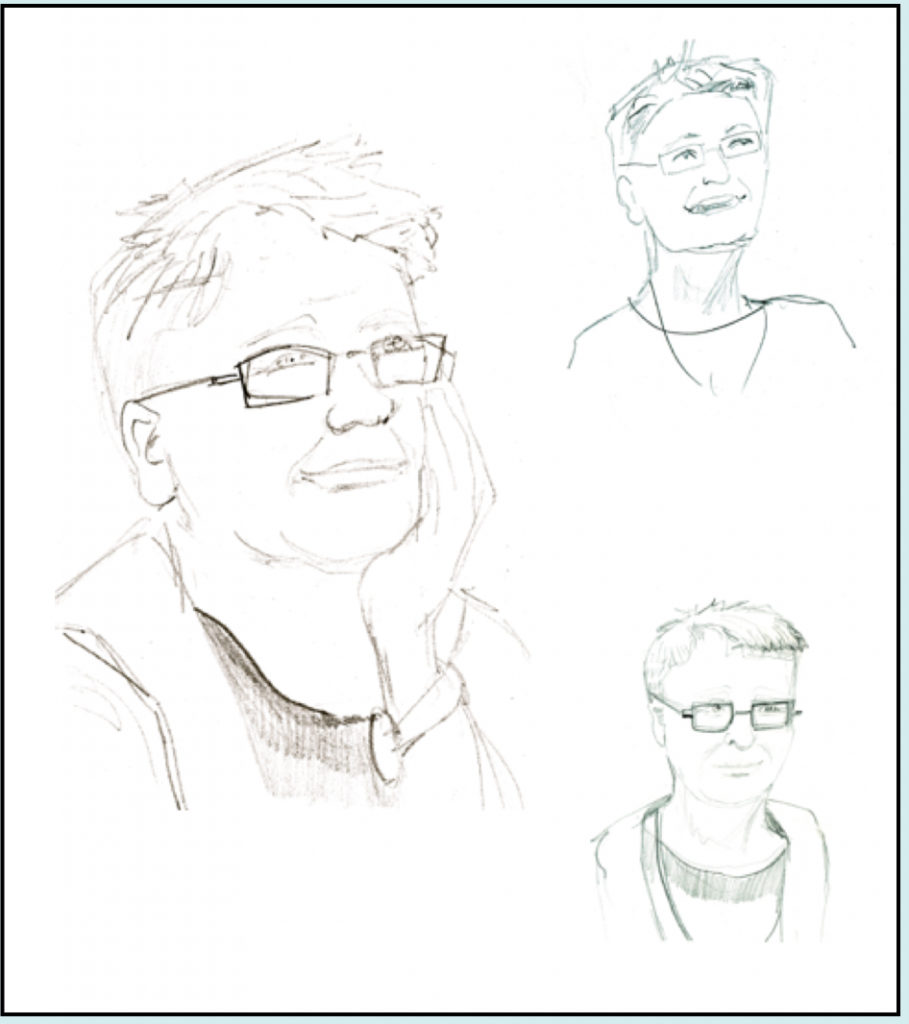
Sheila Jeffreys by Michele-not-on-Twitter
“The difficulties in having this meeting show how transgenderism is a weapon aimed at the heart of feminism.”
With this statement, accompanied by a karate chop, Sheila Jeffreys grabbed her audience by their penis-free short and curlies. She began by observing how in the 70s she would publish her address and phone number in the London Women’s Liberation Newsletter and invite women round to her Putney flat for discussions. How things have changed.
“In 2014-15 I had to have security guards at many of my lectures; I had to have my name taken off my door so my room couldn’t be identified.”
Jeffreys, who has lived and fought through second wave feminism and throughout it all has articulated the struggles of women as an oppressed group, was clear: ”You cannot have a movement against oppression unless you can recognise that a certain group of people are oppressed… you need to be able to articulate what is the category of the oppressed.”
The meat, as it were, of her talk explored the idea of Parasitism.
“When members of the oppressor class claim to be the oppressed, and parasitically occupy the bodies of the oppressed, they speak for the oppressed; they demand to be recognised as the oppressed and to enter all sites and discussions set aside for the oppressed, there is no space for women’s liberation….Men’s sexual rights become the focus of what was once the movement for women’s liberation…”
And so began the tour, at turns gruesome and hilarious, of the side of transgenderism not shown in the current media love-fest. Jeffreys took us from the original Beaumont Society where polite retention of ones male genitalia was de rigeur (it now refers to itself as a Transgender Support Group), through to a harsh dose of reality: the fetishism which she believes to be at the basis of the movement.
“If anybody has doubts whether this is about sex or about a gender that floats down from the sky with the stork and just lands on unfortunate men I do suggest that you look online.”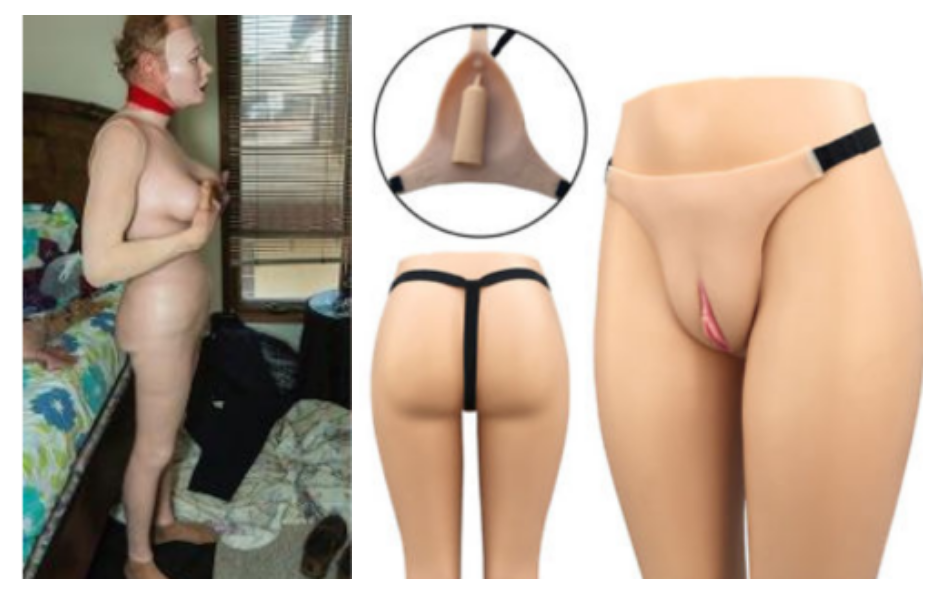
Jeffreys spoke of pornography where men are forced put on clothing associated with women or ‘become’ girl children or pregnant women; of pornography concerning breastfeeding, where prostituted Asian boys express milk that has been brought on by female hormones.
She believes that most men who claim to be women are homosexuals who cannot cope with their sexuality and mused as to whether the trend to ‘transition’ which we are now seeing is a construct of this pornography, which is estimated to be an astonishing 10%- and growing- of the market.
Jeffreys’ slides of the range of online fetishistic items brought a series of groans from the audience: the full body suit (above), where the male literally encases himself in the body of the female, eerily highlighting her point about parasitism.
The comedy highlight was the painful-looking ‘camel gaffe’. “Men get terribly excited about camel toe,” she observed, with a hint of bafflement in her voice as she speculated as to where the male genitals actually went once shrouded in such a contraption.
Jeffreys spoke of the 1990s when post-modern queer politics became fashionable. This movement claimed that “there are many different kinds of genders and women can pretend to be-” here she paused and heaved a long sigh, “-men and men can pretend to be women and it’s revolutionary and it’s transgressive and it will show to everybody that gender isn’t something real and the revolution would happen. Judith Butler said that,” she adds. “Lots of them said that and did the revolution happen? No.”
She went on to speak of the original Transgender Bill of Rights created in America by a man who ran cross dressing weekends in his spare time… “an ordinary married man, couple of kids,”… and another man who did go on to ‘transition’. The UK Gender Recognition Act, says Jeffreys, has its roots in this movement.
“It has to be said a lot of us were asleep- a lot of us were asleep.” Jeffreys muses on how this was allowed to happen. “Hair flick! Gosh! And then they get a certificate.” she scoffs.
Thus the Gender Recognition Act established gender, which speakers and audience alike perceive as a set of harmful stereotypes about what a woman should be, in law. If the current proposed changes are made to the GRA, and self-identification becomes the only requirement, then the current need for letters from two doctors and time spent in ‘lived experience’ will no longer be needed for a man to legally declare himself a woman and vice versa. No wonder Jeffreys is exasperated when she and other second wave feminists fought for literally decades against the idea that there is a ‘correct’ way for women to act and dress. What hopes they must have had for the 21st century, yet here we are and women are being told that an elusive ‘essence of woman’ can somehow be measured and validated.
The men who are are now speaking for women within political parties and even on International Women’s Day, are trying to stop any discussion of the things that affect women’s bodies, such as menstruation, abortion, childbirth, pregnancy and breastfeeding. They claim such discussions are ‘transphobic’ or ‘problematic’ and Jeffreys has a theory about why that might be.
“It makes them feel less authentic because they don’t have that experience and they don’t have that biology. If we can’t speak about our bodies- which is the very basis of feminism because women are actually oppressed because of our bodies- then that is a very big difficulty for us.”
To conclude, Sheila told us an anecdote about an ex-boyfriend, amusingly named Tim, who told her – on the up escalator in Harrods in 1971- “Sheila, I really want to be you, I want to be inside your skin.” She spoke of how disturbing she found this comment – which we can presume Tim considered to be a compliment- concluding that it was because “we know men’s violence, we know men murder women, we know men cut up women, we know what men do with women’s body parts. It’s reasonable that we should be disturbed.”
“I must stop,” she observed, looking at her watch. “Can I just say that I think this is an extraordinarily historic meeting… it marks the stage at which women’s voices are going to be heard more and more and more. I hope that there is huge progress in the next couple of years.”
As Sheila Jeffreys took her seat and we applauded, I looked around at the illuminated and hopeful faces of the women who filling the room. Some were chatting excitedly to the woman next to them, some were scribbling on the provided notepads; many looked pensive and hopeful. Jeffreys’ thought provoking presentation took us from laughter to the point of tears and back again. She had started by referring to us as an “incredibly well informed audience. I’m supposed to tell you what? You know everything I’m going to say,” but she was wrong. Jeffreys talk was inspiring and gave us all food for thought. She sat down to cheers and thunderous applause. Had she spoken for another hour, another two, I believe we would have continued to sit and listen, mesmerised, to this wonderful woman who had lived through second wave feminism and was now here to share her strength and experience with us all.
DR JULIA LONG
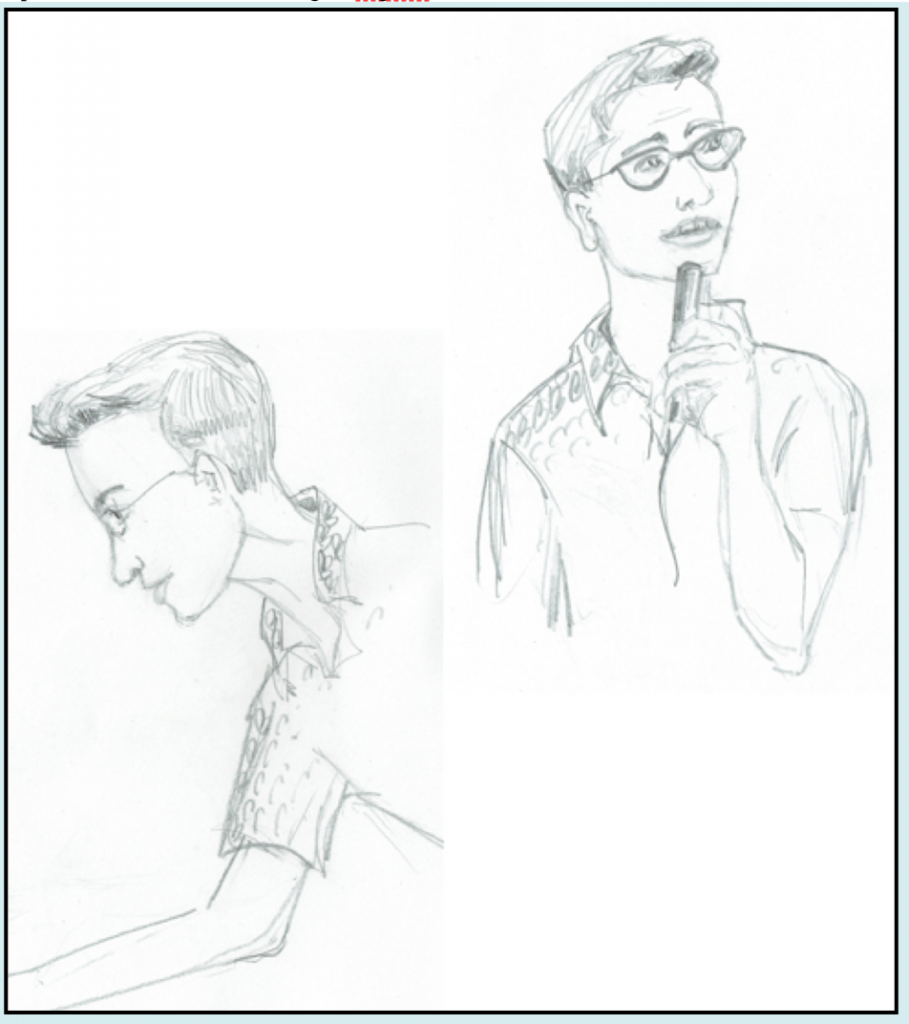
Julia Long by Michele-not-on-Twitter
Dr Long began by echoing the thanks to David Davies for hosting this meeting. This was met with applause and Davies smiled somewhat shyly. I doubt he had been the only man alone in a room with several hundred women before and I doubt it’s an evening he will forget in a hurry.
When Long told us how Millwall had said the event wouldn’t be able to go ahead because they had a duty of care to their staff, but also because they had concerns for their reputation, our laughter echoed around the walls. It was a huge letting go, a sense of both cameraderie and relief. We were excited, and despite attempts at sabotage and intimidation, were here. Common sense had prevailed, at least for now. It was the best of times, it was the worst of times. And we would not be silenced. I pulled myself out of a reverie and picked up my pen again as Julia continued.
“I just wanted to make this observation as well: this is the first time that there’s been a panel of lesbian feminists in the House of Commons where we haven’t had to abseil in!”
One of the things that really struck me about this meeting was the sense of unity and humour. Despite our very serious concerns, there was something about the fact that we had all come together ‘IRL’ to share support and sisterhood. What the hell are these jokes about feminists being serious and sour faced? There was so much love and laughter in that room.
Long reminded us of the importance of analysing male dominated language, of the relationship between power and language, and how the politics of 2nd wave feminism and the women’s liberation movement was developed through language, through the breaking of women’s traditional silence around things like child sexual abuse and male violence; how women were developing a new language to reflect their experience and how that led to the development of women’s services and women’s culture: also things like rape crisis centres, women’s refuges and the development of lesbian feminist culture. She spoke of Julia Penelope’s work on the patriarchal language of discourse, the universal ‘mankind’ and the universal ‘he’.
“I think all of these things help to redefine woman, from a patriarchal definition of women to a more liberated version: a women’s version of reality that women were actively seeking to bring into being. We really have to remember what it is that is being erased when we talk about female erasure.”
Long said she appreciated the ‘sense of history’ that Sheila Jeffreys brought to the discussion; the knowledge that ‘transgenderism’ in its current form hasn’t always been around, despite the current narrative. Recently, out of curiosity, Long looked in a 1991 dictionary to see if it contained the word ‘transgender’. The dictionary went straight from transfused to transgenic. She also looked up ‘transexual’, which was defined as a ‘person having the physical characteristics of one sex and the supposed psychological characteristics of the other’.
“This version of transsexual is actually quite transphobic.” observed Julia, jocularly. “Maybe we should write to the Oxford dictionary producers about this hate speech?”
We were asked to think about how the term ‘trans’ operates and what it achieves. Dr Long showed us some slides of tables and noted that tables have certain characteristics, for example four legs and a flat surface for eating- by which we all agree that they are tables. Then she showed us a watch, which has its own, different characteristics- such as a strap and the fact that you put it on your wrist and use it to tell the time.
“If I was to say to you,”That isn’t a watch, it’s a table,” you’re obviously going to say, ” No Julia, it’s not a table because you don’t wear a table round your wrist and you don’t eat your dinner off a watch.”
Then she pointed out that if she ‘made a clever move’ and told us it was a trans-table, she could make the claim that although it wasn’t like the other tables; it didn’t have four legs and wasn’t made of wood, she could claim that it was “one of those tables that you wear on your wrist… it’s one of THOSE tables!”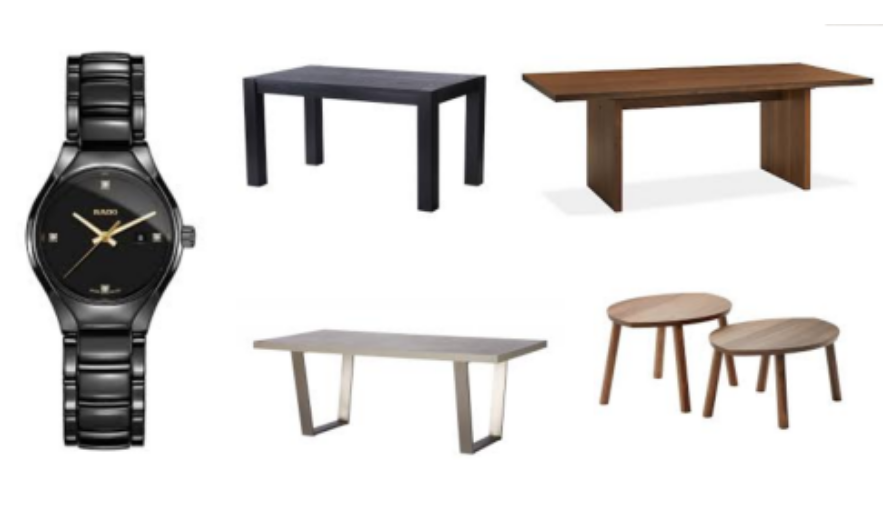
Julia observes that once everyone around us is referring to the watch as a trans-table:
“…like lemmings rushing to the cliff, all singing as one saying that is a trans-table, it suddenly becomes quite difficult to say, “Well that’s just a watch…. Suddenly an adult human male with certain physical capacities and features and physiology and anatomy is no longer a man… it’s a trans-woman.”
If you dare to disagree.. well, as she reminded us- Millwall football club has a reputation to defend!
The room laughed wryly at the utter absurdity of this surreal yet genuine situation, but we were brought back to sobriety by Dr Long’s next comment.
“One thing that my involvement in this topic over the last few years has taught me is that you can make people believe absolutely anything, very, very quickly.”
She stopped and looked around. “Am I out of time?” she asked.
“Check your table!” called a voice from the audience.
THE POWER AND CONTROL WHEEL
I’m lucky enough never to have been involved in a situation where I needed to seek shelter from a violent partner or family member, nor have I ever worked with women who have, and I had never come across the ‘Power and Control Wheel’. Dr Long explained that power and control are central to domestic abuse and explained to us how the wheel works.
On the outer wheel is the reference to physical and sexual violence, or the threat of violence: the inner wheel encompasses intimidation, emotional abuse, isolation, minimising, denying, blaming, using children, male privilege and economic abuse; using coercion and threats.
“This really feels very familiar, it feels like these two parallel worlds are going on…Let’s have a think then on how the transgender movement operates.. as a male body; as an army of patriarchy trying to exercise power and control over women…”
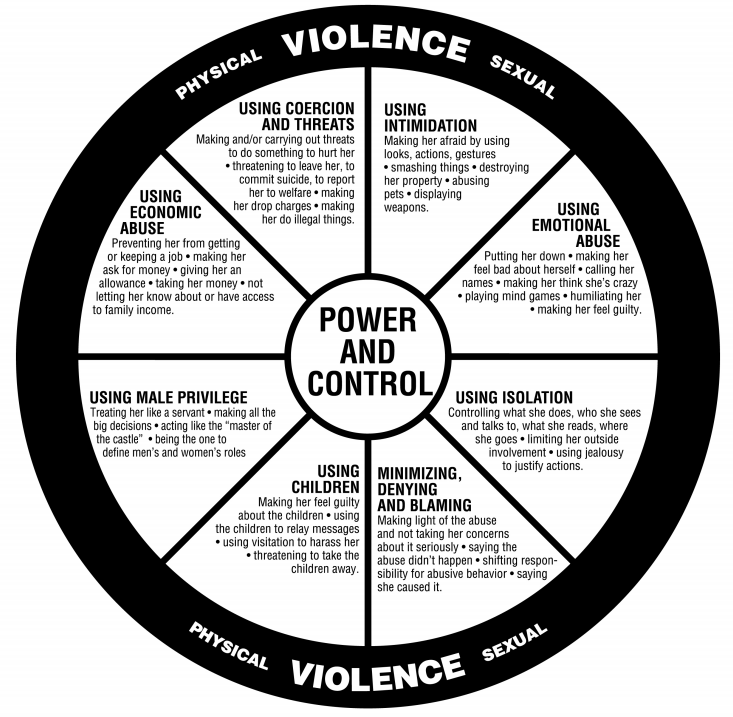
PHYSICAL VIOLENCE
Dr Long spoke of the violence and the threats of violence that transactivists use against women, showing us a slide of the infamous ‘die cis scum’ meme and a variety of Tweets calling for violence against women. She referenced the violence against Maria MacLachlan, a 60-year-old humanist funeral celebrant who was punched in the head by a transactivist at Speakers’ Corner while waiting to attend a feminist discussion, and how A Woman’s Place had recently tweeted that a woman on a picket line had been verbally abused and harassed for having attended one of their meetings.
EMOTIONAL ABUSE
“I think the fact that we have been constantly told now in the media that men are women is a mass form of gaslighting; that we are all being emotionally abused by that.”
Long also noted transactivist Shon (Sean) Faye’s infamous comment (below)
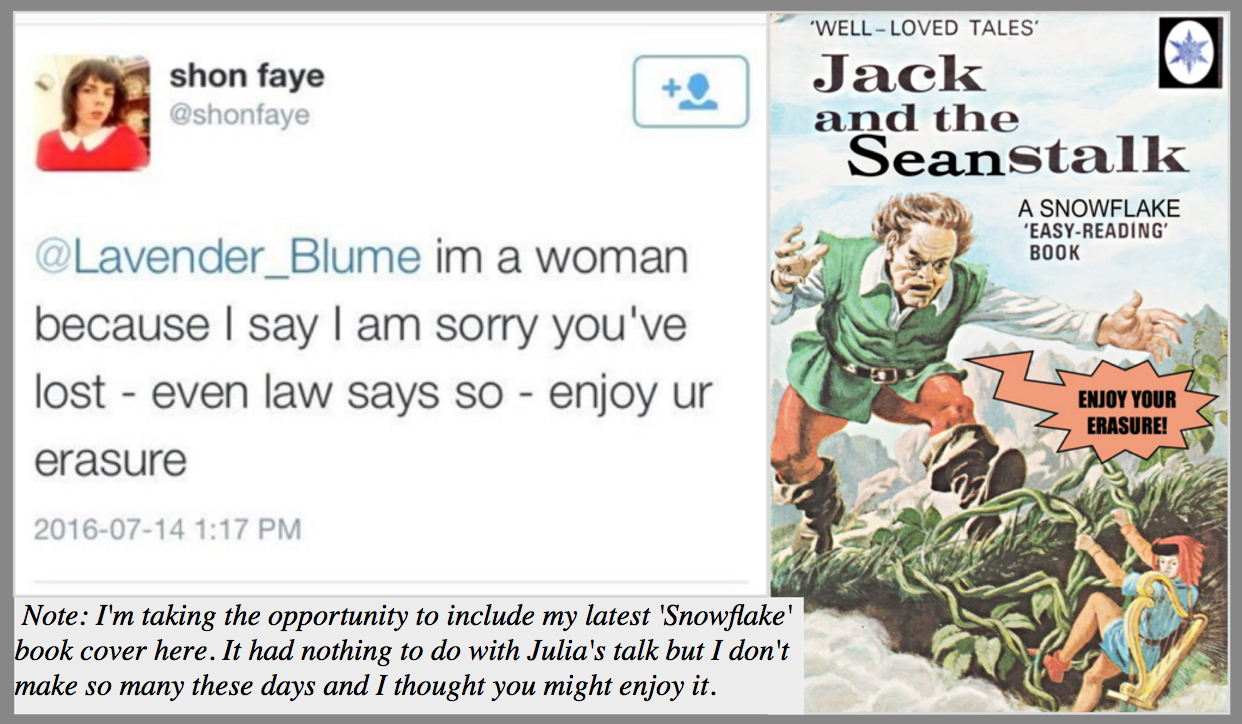
MINIMISING, DENYING & BLAMING:
Julia referenced another Tweet (which, like so many others, has now been removed by the postee) which claimed of the meeting that, ‘this hateful event will incite violence and drag us back to nineteen sixties gender roles’ adding, to much laughter from the audience:
“Er, really? 1960s gender roles? Just look at the speakers.”
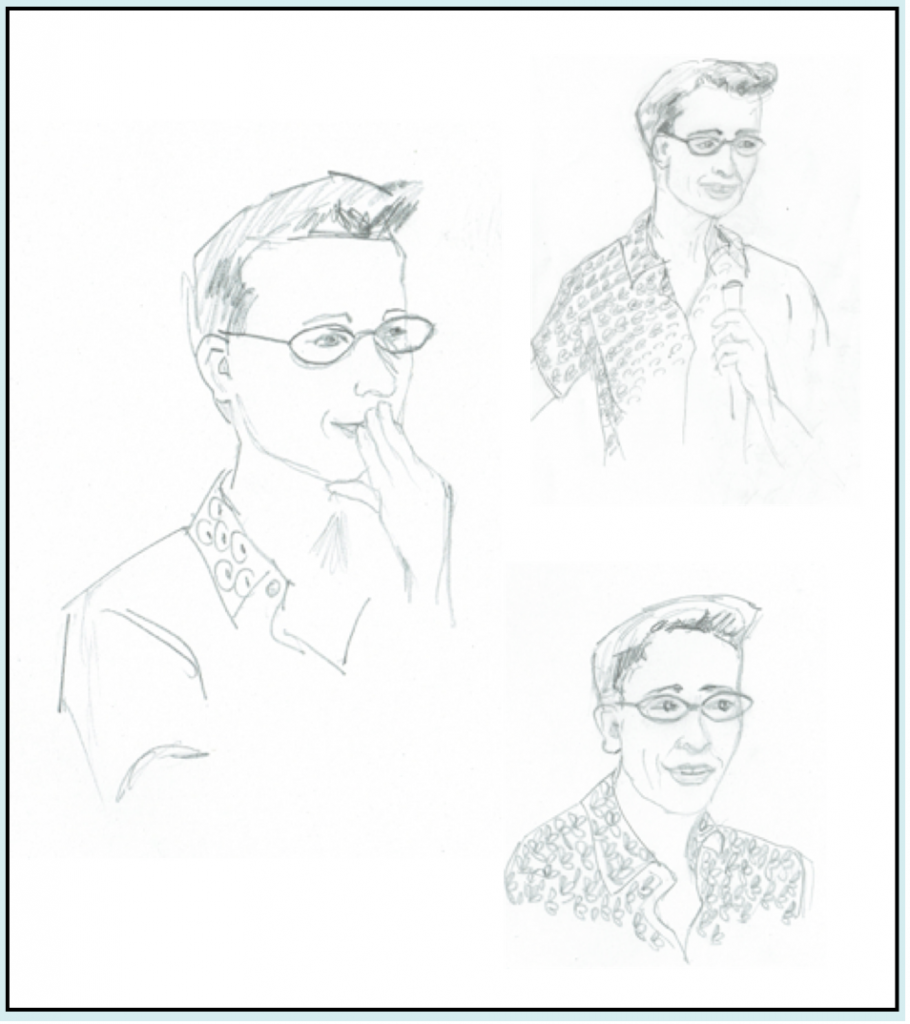
Julia Long by Michele-not-on-Twitter
Long observed that current portrayal is actually a total reversal of what’s really going on and observed that Venice might want to say something about the investigation for ‘transphobia’ she was recently subjected to by the Labour Party.
Allan never did get a chance to speak to us, but you can read the surreally Orwellian transcript of her interview here.
“This kind of blaming and labeling of us as a hate group is then used to justify the absolute torrent of abuse and hatred that we are getting.”
USING CHILDREN:
Dr Long observed that the suicide statistics that get quoted re trans-identified children ‘stand up to absolutely no scrutiny’ and that there is a huge amount of emotional manipulation being used by those who use children to push a trans-agenda.
“There’s an awful lot to be said about this: the rhetoric and the narrative and the discourse. Basically, if you dare to say ‘that is a man’ you are killing children and that is the most extraordinary rhetorical device.”
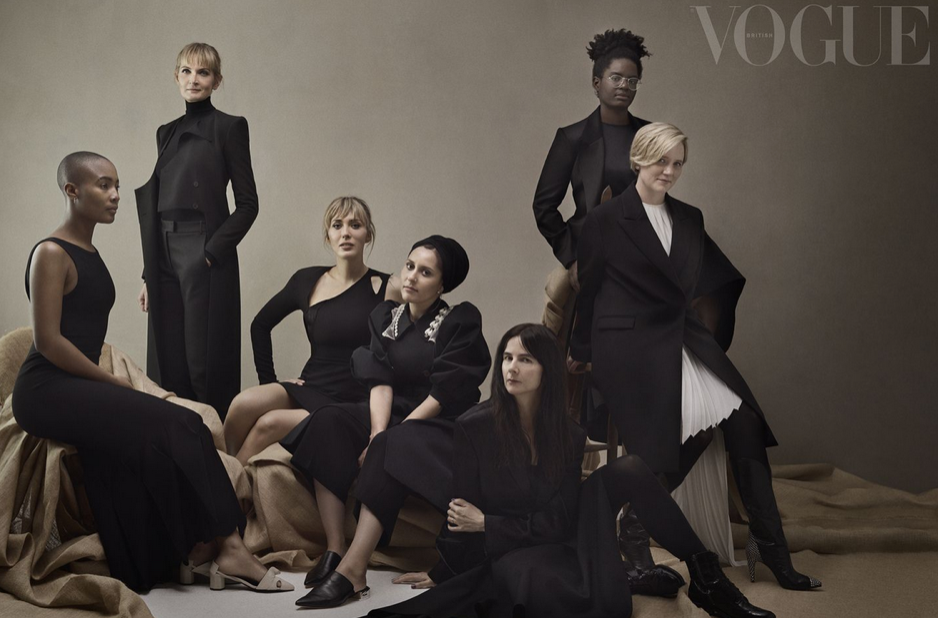
USING MALE PRIVILEGE:
Long showed us a slide of a Vogue article ‘The New Suffragettes’, observing “We’ve got a man (Paris Lees) smack bang in the middle.” She also spoke of International Women’s Day, where Munroe Bergdorf, Natacha Kennedy and Lily Madigan, (all trans-identified males) spoke at various women’s events.
“There’s so much to say about the way these men attempt to garner feminism for themselves.”
ECONOMIC ABUSE, COERCION & THREATS:
Observing that women are worst hit by austerity measures, Long noted that there is a ‘disgraceful underfunding of domestic and sexual violence services’ while transactivist group receive funding to perpetuate the idea that men can become women, and that profits are being made by many in the therapy and medical professions. She spoke of the harassment of radical feminists by a man who caused a scene because he was offended by the placards waved by women on an International Women’s Day march and rally. She referenced the doxxing of women and the threats made by activists to get them fired from our jobs.
“The Power and Control wheel isn’t really about domestic violence it’s about patriarchy. This is about how patriarchy works whether it’s on the micro level or the macro level.”Dr Long finished by going back to the importance of language and how it is used, quoting something she had found on Facebook and telling us how she could have cried in her happiness in realising that there really were others who understood what is going on.
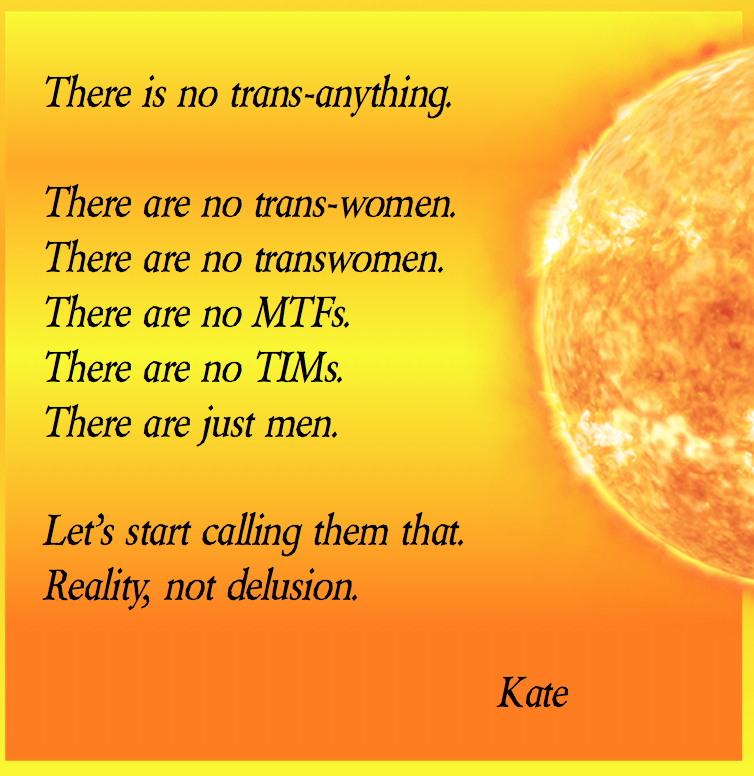
I’ve made the words Julia spoke into a picture because her reading was met with such applause and understanding from the audience, amidst cries of ‘Kate wrote that! She’s here! Kate is here!’ I didn’t see the original Facebook post, so apologies to Kate, the OP, if I haven’t punctuated this as she might have done:
“I really appreciate the woman who wrote that. I thought she was absolutely echoing what Andrea Dworkin had said 30 odd years ago” concluded Long.
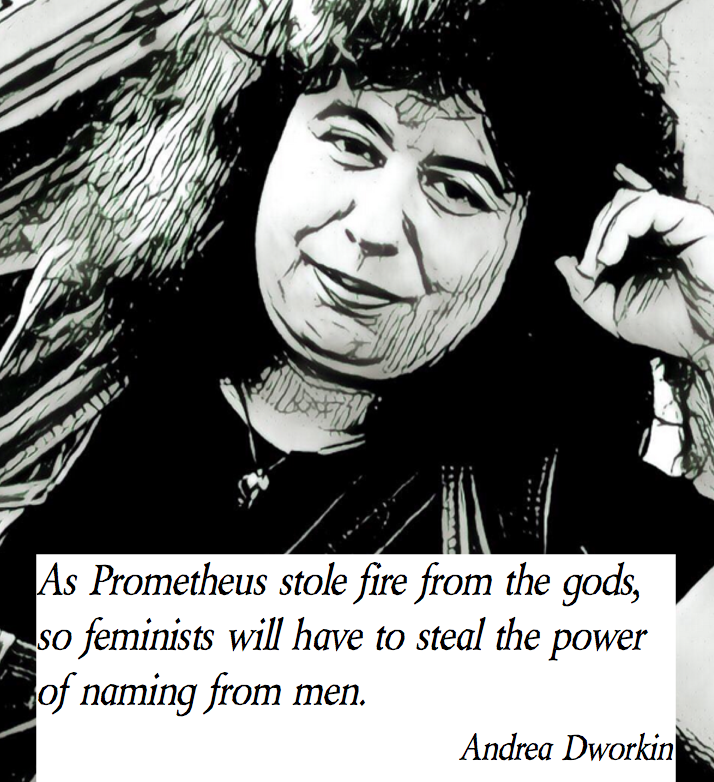
As Dr Long sat down, the women in the room bust again into applause.
We had been in the room for nearly 90 minutes at this point yet we were still as engaged and interested as the minute we had sat down and filled with anticipation as to what the next speaker might have to add to the discourse.
ANNE RUZYLO
Anne Ruzylo, ‘fearless warrior’, lesbian and ex-Labour party Women’s Officer for Bexhill Battle and – who tore up her membership card and resigned after run-ins with trans-identified teen Lily Madigan- was next to speak.
Observing that ‘the professor and the doctor’ were hard acts to follow, Ruzylo rose to speak with a smile on her face, asking who was coming ‘for a sing-song in the pub afterwards’ and nodded with cheerful approval when met with, “Yes! Me! We are!”
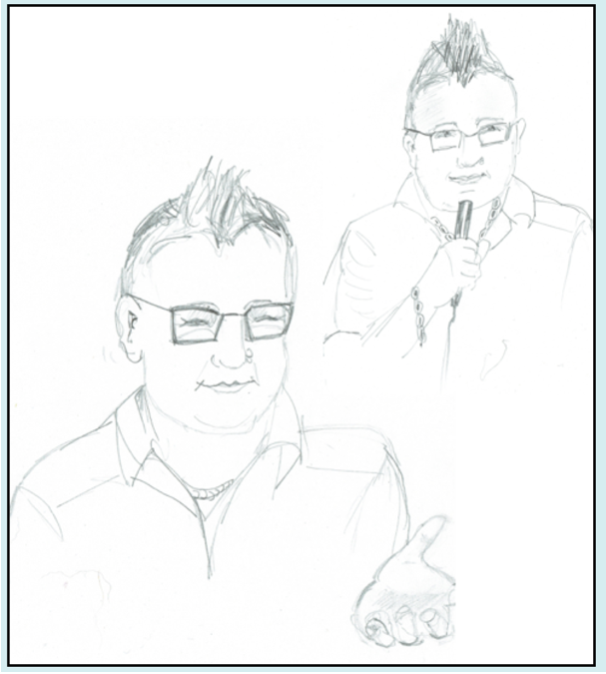
Anne Ryzlyo by Michele-not-on-Twitter
Ruzylo told us how she was born in the revolutionary mid-sixties, a time when young people were experimenting with sex and drugs, a time when, she observes, ‘transgenderism wasn’t a thing‘. She learned about Biology, “and that Biology hasn’t changed,” from her midwife mother. Her parents were separated; her father was a butcher. In her teens she worked for him at weekends and he let her use the knives and the slicer, “even though I was a girl”.
She remembers being in a playschool where boys weren’t discouraged from playing with dolls- even when they swung them around by the hair- and fondly recalls perfecting the art of weeing into the toilet while standing up.
“I was fascinated but that’s how boys did it.” Ruzylo said, adding, ” I knew I was a girl though.”
Ruzylo didn’t like dolls or skipping or shrieking. She liked playing football and playing with matchbox cars. She wore jeans, T-shirts and she loved her baseball boots. Ruzylo didn’t want to be a boy, just to be allowed to do the things boys did, and try to do them better. In the 70s, although she was too young to know of such things, “I was a child after all, I was busy doing childish things,” gay liberation was in full swing after the Stonewall riots of 1969 had helped pave the way.
“I had my holy communion, I chose the name Christine. My mum was a tad disappointed because it wasn’t terribly Catholic or saintly, but I really liked this girl Christine. I thought she was heavenly.”
Ruzylo recalls spending time at boarding school where she had a best friend called Helena.
“We would whisper to each other after lights out. We’d also take it in turns to tickle each other’s arms. I liked how close girls could be without boys around to tell them us we yucky and stupid. Transgender wasn’t a thing.”
The 80s, she reflects, were a time when men dressed effeminately, but were still men. And while transgenderism wasn’t ‘a thing’, Aids was.
“I’d established some years before that I was a lesbian. I was pleased as punch that I had a title. Lesbian! I was really cool about it.”
In the 80s, Ruzylo went to her first lesbian and gay ‘Pride’ march. “I say lesbian and gay,” she eyes the audience mischievously, “Back then there were only lesbian and gay.”
When she decided to come out to her mum on the day before her 19th birthday, her mother was horrified.
“My mum informed me that she wished I’d never been born,” Anne told us, to sharp intakes of breath and gasps of horror from her audience. “Had she known how I’d’ve turned out she would’ve had an abortion.“
Returning home from work one day shortly afterwards, Ruzylo found her mother had gathered a house full of friends,family and colleagues to tell Anne how disappointed they were by the revelation that she was a lesbian.
“They couldn’t even say it,” she remembers, lightening the painful recollection; making the audience laugh by mimicking her relatives muttering the word ‘lesbian‘ like a disguised cough into their hands. ” I’d walked into ‘Oranges are not the Only Fruit’… but at least I was spared an exorcism.”
Ruzylo found herself a girlfriend, fled to London and proudly became “the best bus driver I could be. I could drive a bus better than most of the men.”.
“I’ve always been one (a lesbian). I knew playing with cars, playing football, dressing in male clothes, making my dolls cohabit and having a Honda 50cc haven’t made me a lesbian- just like all those things equally wouldn’t make me a boy. That would be silly.”
“Had trans been ‘a thing’ back when I was growing up, who knows what might have happened. I hurt my mother deeply by telling her I was a…” Anne grinned and again mumbled an incoherent ‘lesbian’ as the audience laughed.
Even now, she told us, she finds it hard to walk through the ‘women’s clothing section of a store because it makes her feel so uncomfortable, describing it as “alien to me.” Raised as a child in the current climate she says she could easily have believed herself to be born ‘in the wrong body’ and believed that transition could ‘fix’ her. She also thinks her Irish Catholic mother might well have seen transition as a cure for her… mumble… lesbianism.
Ruzylo noted that lesbian girls are 12 to 19 times more likely to display ‘extreme gender nonconforming behaviour’, before reaching school age, compared to heterosexual girls. She worries about these girls. She talked of concerns about the damage caused by breast-binding and how a whole category of pornography has developed surrounding this.
“I wasn’t born in the wrong body. No child is. I find it heartbreaking that any child would feel like that.”
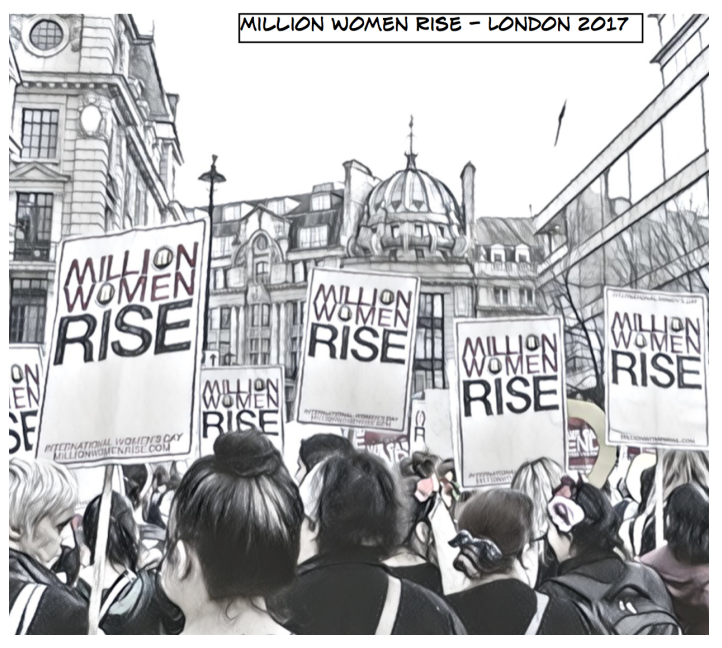
Ruzylo’s tells an anecdote about being mis-gendered at this year’s Million Women Rise rally and nearly thrown off the march when she was mistaken for a man.
She scoffs at the idea that mis-gendering should be classed as a hate crime, “that would be idiocy in my opinion”, although she does wonder if it may actually happen.
“I have been a gender non-conforming woman all my life. I am misgendered practically every day of my life. I have been since the age of 14. By the way, I have never reported it to the police.”
Anne talked of the sex stereotypes surrounding her growing up and how although times have changed in many ways she has battled sex stereotypes all her life.She lamented that as the idea of gender replaces sex, the good working practices surrounding equality that she has helped develop will no longer be used.
“It seems that being a person who doesn’t identify with a gender has now become complicated and baffling. We are in a world with more labels to attach to folk than boxes to put them in.”
In the last five years or so, observed Ruzylo, gender has gained growing importance. Lesbians have always been seen as a challenge to men and now they are being told that not wanting relationships with ‘trans-women’- 80% of whom keep their penis- makes them bigoted and transphobic.
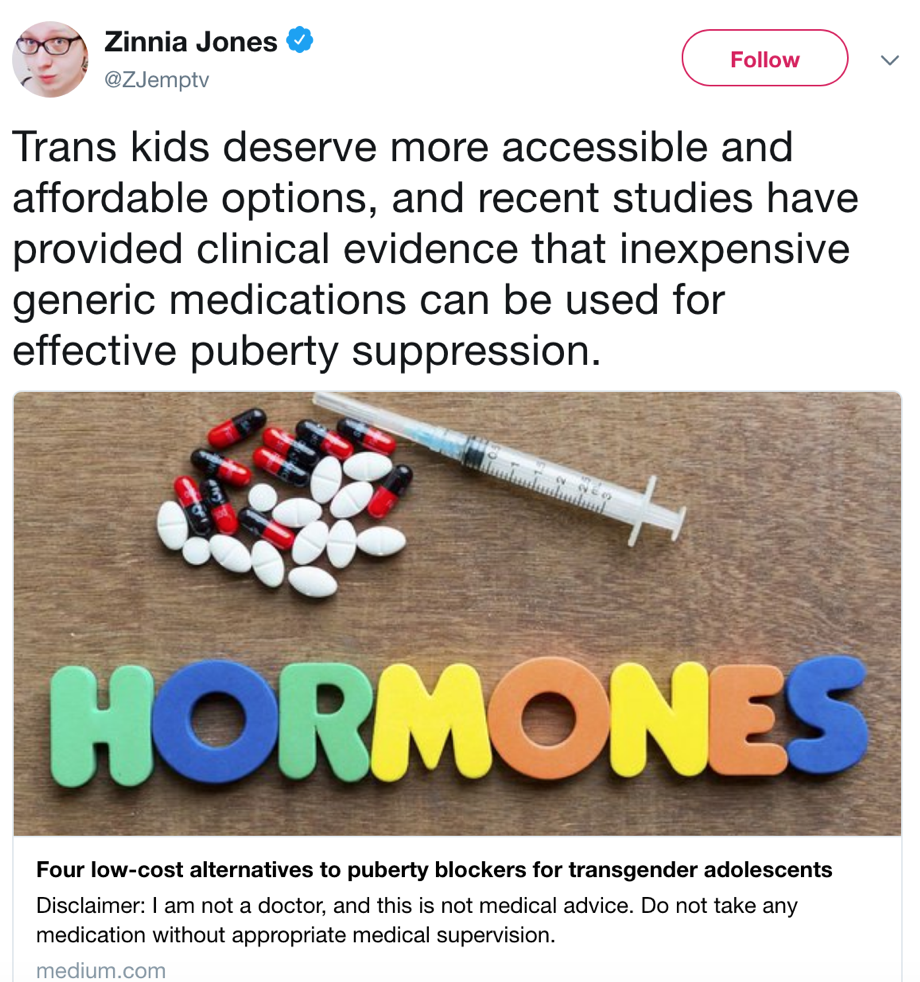 Anne also has serious concerns about young lesbians being told they may have been born in the ‘wrong’ body and that they need to take puberty blockers and hormones, and undergo surgeries to ‘fix’ themselves. “I’m concerned that normal puberty is been treated as gender dysphoria.”
Anne also has serious concerns about young lesbians being told they may have been born in the ‘wrong’ body and that they need to take puberty blockers and hormones, and undergo surgeries to ‘fix’ themselves. “I’m concerned that normal puberty is been treated as gender dysphoria.”
She reminded us that these girls are the subject of experimentation for untested and potentially unsuitable drugs which they can purchase illegally online, and they are vulnerable to the trans-identified adults who befriend them on social media and tell them where to purchase these drugs.
Many women in the room clapped loudly in support of this view.
“They look in magazines and on social media etc and they don’t see anyone that looks remotely like them. Boys tell them that their body isn’t normal: they don’t look like the women in the porn films they’ve seen where women have been trimmed, shaved, and had bits removed and bits added. We live in a cut and paste society.”
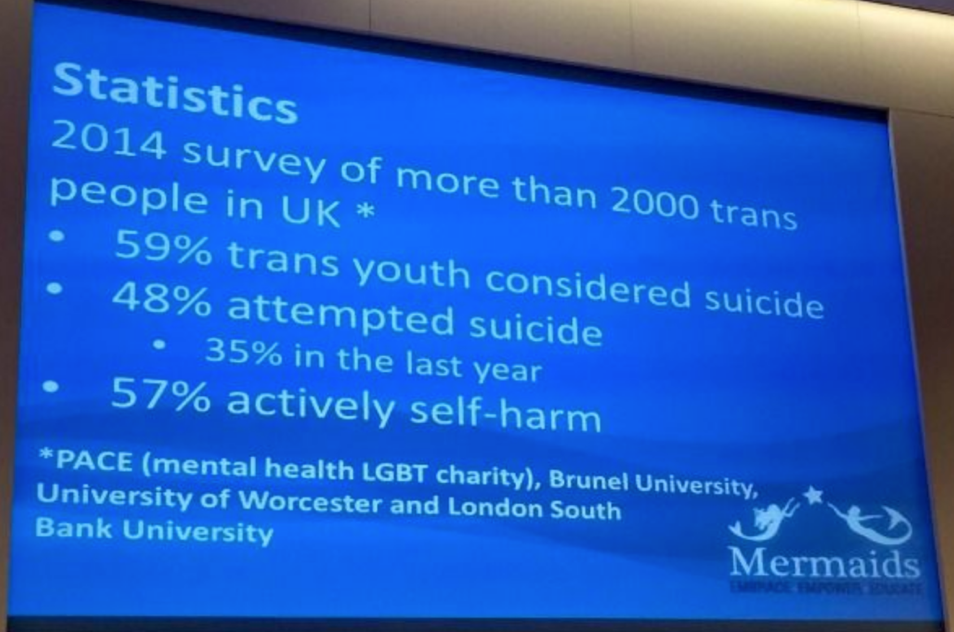 Ruzylo pointed out that inaccurate information concerning suicide rates amongst trans-identified children is being frequently repeated (see right) by organisations who support early treatment with blockers and hormones, convince parents that they need to support their child’s transition and want the NHS to relax protocols. She spoke at length of the findings of a scientist who critically examined the Pace survey. Here are the findings which come to the conclusion- among other things- that there were just 27 trans-identified young people in the survey, not 2,000 as is so often stated.
Ruzylo pointed out that inaccurate information concerning suicide rates amongst trans-identified children is being frequently repeated (see right) by organisations who support early treatment with blockers and hormones, convince parents that they need to support their child’s transition and want the NHS to relax protocols. She spoke at length of the findings of a scientist who critically examined the Pace survey. Here are the findings which come to the conclusion- among other things- that there were just 27 trans-identified young people in the survey, not 2,000 as is so often stated.
Ruzylo went on to discuss the possible consequences of removing our current legal sex-based protections and replacing them with gender-based protections and how this could harm women and girls from a legal standpoint. These are just some of the rights we could lose:
The legal right of women to assemble outside the presence of men and the right to organise politically against sex-based oppression by males.
Educational programs, athletics programs, sports competitions, grants, scholarships, board and trustee designations created for women.
The right to be free from the presence of men in areas of public accommodation where nudity occurs.
The right to create female-only reproductive clinics, rape crisis services, support groups or other all female organisations.
Self-identification is already being used, said Ruyzlo, and men are already manipulating situations to gain access to women. She worked in the prison service for nearly 19 years in both men’s and women’s prisons and only ever came across one woman who wanted to transition and three men who did.
“Now our prisons have in the region of 125 (trans-identified prisoners) It’s is thought that approximately half of those are serious sex offenders… we already know of two male born prisoners were placed in women’s prisons and subsequently sexually assaulted the women there.”
She called on the UK and Scottish government to take this seriously, saying it’s not enough to claim other countries have made the change and there is no problem. In Ireland prisoners are imprisoned according to their biological sex and not their legal gender, which protects female prisoners from men demanding access to female space, but the same would not be true for the UK.
“Women and girls deserve better,” she concludes, and the loudly supportive response of the audience shows that it agrees.
When Anne had finished and the applause had died down, Venice observed that there was unlikely to be time for a Q&A, reminding the women present that we planned to meet at a bar after the meeting was closed and that we could carry on the conversation there.
“Before that,” she added, “I would really like to ask Posie Parker if she could come up.”
Someone shouted out, “I am Posie Parker!” She was joined by further voices and so it was that Posie stood up from her place at the back of the hall and walked to the front to the sound of a score of women calling, “I am Posie Parker!”
So who is Posie Parker?
“I am a 43 year old married mother of four, I am every woman, I am you.”
Posie Parker is a ‘test case’, a woman under investigation by the police for daring to speak out against the transitioning of children and expressing her opinion that it is abusive.
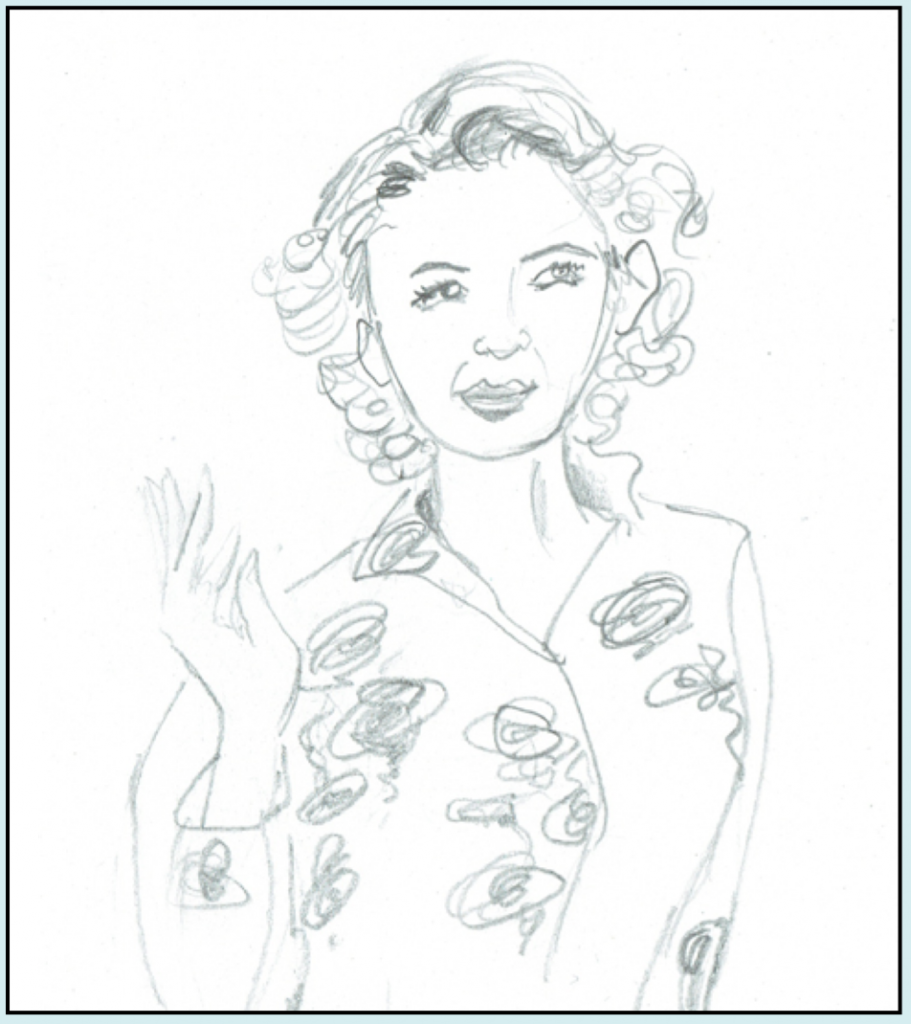
Posie Parker by Michele-not-on-Twitter
“I will not kowtow to an ideology that demands I cannot speak the truth. I will not be compelled to say a man is a woman or that sterilising children is ok…”
The full transcript of of Posie’s speech in the House of Commons, where she told her story to thunderous applause; her blog where she defends our right to free speech, and a link to her crowd-funder are here.
We are women making history.
“I don’t know how I’m going to follow that,” said David Davies, when Posie had finished, rising and thanking the speakers and audience for allowing him to host this event. He expressed his concern about a doctor in his constituency who had been prescribing cross-sex hormones to children as young as twelve, and assured the audience that he was against any kind of discrimination against LGBT people:
“but you can’t have men in a women’s prison or in a women’s changing room, or in a refuge… It’s just common sense isn’t it? And there was such an outpouring of rage that came my way – I was called a C.U.N.T. by the Conservative LGBT officer!”
Davies said that the one other belief that we all shared was the right to freedom of speech, and that he had “never known it to be so difficult to hold a meeting,” concluding “but anyway, enough from the man… I hope you have many more meetings. And if you’re finding it difficult to hold them, please come and talk to me.”
This of course, is the reason his support is appreciated and the reason that his speech was met with cheers. Not because we all need to share the same ideas and values but because we should be able to discuss them.
It has been pointed out that David Davies has a history of voting against things that might benefit LGB people: notably calling the idea of gay marriage ‘barking mad’ back in 2012. The point here is not that he needs to agree with everything lesbian feminists have to say: the point here is that he supports their right to have a meeting to discuss their views- and for that I add my thanks to that of the other women present that we were allowed to hear them speak.
Once the applause had stopped, Venice took the microphone, said how much she’d enjoyed the talks and told us that although there was no time for the planned Q&A session, a basement had been booked for drinks at a bar a short walk away.
This announcement was met with further whoops of approval and the meeting was adjourned to chants of, ‘There’s only one Venice Allan!”
Of course, there was a dash for the loos, where someone had left little white business cards reading “Woman – Shhhhh… adult human female” neatly by the sinks.
The cards were cute, and the chatty atmosphere was full of animation and anticipation, but the queue for the toilets was lengthy, so lengthy.
“I can feel my mooncup exploding,” confided the woman standing next to me.
“Come on,” I said. “Let’s use the Gents, there’s nobody in there.”
So we did. And it smelled bloody awful.

I believe there are “transgenderism” is a political movement that harms the tiny minority who are actually transgender far more than that it harms women. TrueTrans are not sexually motivated and it isn’t a “fetish” to us.
re read Dr Long’s bit.
As she said, there are NO trans. Whether transgender, trans-racial, trans-paraplegic, etc.
Lily – I think you must be a writer. If you’re not, then I’m sure you do well at whatever you do, but you missed your true calling. You’re an amazing writer.
@Newfielover41
Aw… thanks so much!
What great rendition. I am posting your blog’s URL to gender critical FB pages and to my own page. Thanks a million!
Faboulous! So sad I couldn’t make it. Well done to all women who continue to speak the truth and thank you to David Davies. I hope to make the next one!
Thank you so much for doing this! You’ve done a great job summarizing the proceedings, although I do wonder if perhaps a couple of the quotes were misheard/mistranscribed.
“I’m concerned that normal puberty is been traded as gender dysphoria” would make much more sense as “I’m concerned that normal puberty is being treated as gender dysphoria,” and “I will not curtail to an ideology that demands I cannot speak the truth” would make much more sense as “I will not kowtow to an ideology that demands I cannot speak the truth.”
You’re right on both counts. Thank you. I’ve made both those corrections now.
A tour de force! Congratulations!
Sounds like you all had an inspirational time. BTW, someone’s probably told you by now but Anne’s name has an ‘e’ – Anne Ruzylo.
Whoops!
“Check your table!”
Thank you very, very much for writing this up (and lovely drawings, btw). Now we didn’t “have to be there” to feel a part of it.
The drawings were by Michele – she’s very talented.
Thanks Lily. Wish I’d been there with you all.
thank you for this, so well written and a fun report of this great event, i wish i was there but your post made me feel like i was!
wonderful thanks for posting this! wish i had been there !
really wish I could have been there (and for the sing song afterwards) It sounds fantastic. Thanks for writing about it. XX
Thank you so much for this wonderful article. We need such work to keep spreading.
I’ve been fighting the trans cult since 1972, and have never met or read a man who had a clue what being a woman was. It was all fetish and obsession. Not one felt he was a girl growing up. Either they became obsessed with Lesbians as young adults or later in life got bored with their wives and kids and invaded our Lesbian community. (I’m guessing that men’s favorite porn, which is about “Lesbians” fuels this mania.)
I’d like to add though, that in my experience, though a few of these men are self-hating homosexuals, the vast majority are heterosexual men who want and demand sexual access to Lesbians. And their violence rate is the same as for other het men.
For decades. Lesbians said no, but sadly, in the last few years, women are betraying women to support these men against us, destroying our last female-only spaces. Ironically, they are treated as far more important because everyone really knows they are men.
Though feminists have been denying that females have very different brains and minds to fight the trans cult claim of “lady brains,” actually we do, which is why almost all violence is committed by males. It works for us and not against us to say we do have different brains to go along with our very different bodies, which is another reason that men can never, ever be women. (Or women be men.)
This is a leaflet I made to protest men being allowed in the international Lesbian only organization Old Lesbians Organizing for Change. OLOC does not allow bisexuals or Lesbians under 60 to join, but now men can get in and immediately they move into power positions. I have two other articles at my blog:
https://bevjoradicallesbian.wordpress.com/2017/08/30/please-if-you-love-lesbians-and-other-women-think-about-this/
Thank you very much for this detailed account, It shows clearly that the meeting was not “debate about the GRA”, it was a hate meeting discussing trans people and associating them – not just words of the GRA, trans people as a group – with various evils. I have saved a copy, it’s reat evidence, thanks!
Pingback: ‘Inconvenient Women’ @Camden Town Hall 13/6/18 | Lily Maynard
For a while now, when engaged in discussion on Twitter, and seeing discussion on TV, I’ve visualised the power and control wheel, and minimising is endemic. Last night I asked someone in Ireland for the Irish Governments Impact Assessment prior to introducing the GRA and self ID, and she responded with the submissions to the consultation saying ‘and there hasn’t been an apocolypse here.’ This is nothing but manipulaton. And try as I will, I can find no impact assessment for Ireland or Argentina, and I don’t think it’s due to my Googling skills.